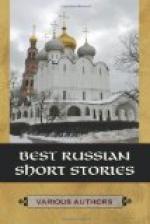Following as a corollary from the love and pity for mankind that make a leading element in Russian literature, is a passionate search for the means of improving the lot of humanity, a fervent attachment to social ideas and ideals. A Russian author is more ardently devoted to a cause than an American short-story writer to a plot. This, in turn, is but a reflection of the spirit of the Russian people, especially of the intellectuals. The Russians take literature perhaps more seriously than any other nation. To them books are not a mere diversion. They demand that fiction and poetry be a true mirror of life and be of service to life. A Russian author, to achieve the highest recognition, must be a thinker also. He need not necessarily be a finished artist. Everything is subordinated to two main requirements—humanitarian ideals and fidelity to life. This is the secret of the marvellous simplicity of Russian-literary art. Before the supreme function of literature, the Russian writer stands awed and humbled. He knows he cannot cover up poverty of thought, poverty of spirit and lack of sincerity by rhetorical tricks or verbal cleverness. And if he possesses the two essential requirements, the simplest language will suffice.
These qualities are exemplified at their best by Turgenev and Tolstoy. They both had a strong social consciousness; they both grappled with the problems of human welfare; they were both artists in the larger sense, that is, in their truthful representation of life, Turgenev was an artist also in the narrower sense—in a keen appreciation Of form. Thoroughly Occidental in his tastes, he sought the regeneration of Russia in radical progress along the lines of European democracy. Tolstoy, on the other hand, sought the salvation of mankind in a return to the primitive life and primitive Christian religion.




